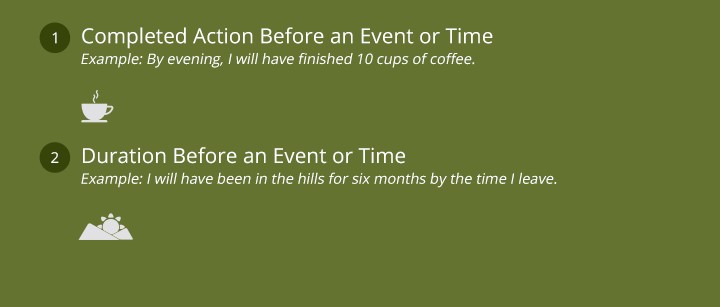Future Perfect Tense is one of the 4 sub-tenses of Future Tense. Simple Past tense refers to completed actions in the future. This tense is formed with the combination of “will” + “have” + the past participle of the verb. It can be differentiated from other sub-tenses through understanding of their structure.

The structures of the Future Perfect Tense with examples are as follows:
1. Sub + shall/will + have + v3 + obj. (Affirmative i.e. Positive Sentences)
For Example:
- My father will have cooked dinner.
- She will have finished the assignment tomorrow.
2. Sub + shall/will + not + have + v3 + obj. (Negative Sentences)
For Example:
- My father will not have cooked dinner.
- She will not have finished the assignment tomorrow.
3. Shall/Will + sub + have + v3 + obj? (Positive Interrogative)
For Example:
- Will my father have cooked dinner?
- Will she have finished the assignment tomorrow?
4. Shall/will + sub + not + have + v3 + obj? (Negative Interrogative)
For Example:
- Will my father not have cooked dinner?
- Will she not have finished the assignment tomorrow?
5. Wh-word + shall/will + sub + have + v3 + obj? (Wh- Question)
For Example:
- What will my father have cooked?
- When will she have finished the assignment?
Where Future Perfect Tense is used?

Future Perfect Tense is used with actions/events which will occur before a specified time In the future.
- He will have achieved success by 2020.
- They will have reached Australia by Sunday.
- We will have built house by next month.
- My father will have exercised by 8 o’clock.
- I will have finished painting.
Future Perfect Tense is used to express certainty over the occurrence of events/actions in the future.
- The teacher will have started the class.
- Harry will have reached the hospital till evening.
- I will have gradated by next year.
- The train will have left by now.
- He will have proposed her on August.
Future Perfect Tense is used with time expression i.e. By/before + point in time/in + period of time structure.
- He will have completed an M.B.A. course in two years.
- By 2018, players will have learned new rules and regulations.
- My friend will have married by now.
- Harriet will have played international matches by now next year.
- She will have apologized for her insensitive behavior by now next week.